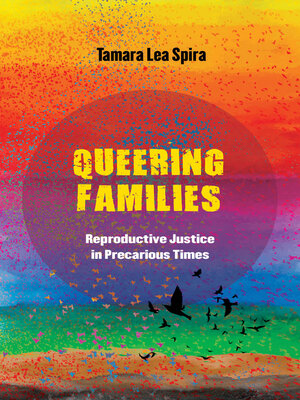Queering Families
ebook ∣ Reproductive Justice in Precarious Times · Reproductive Justice: a New Vision for the 21st Century
By Tamara Lea Spira

Sign up to save your library
With an OverDrive account, you can save your favorite libraries for at-a-glance information about availability. Find out more about OverDrive accounts.
Find this title in Libby, the library reading app by OverDrive.



Search for a digital library with this title
Title found at these libraries:
| Library Name | Distance |
|---|---|
| Loading... |
Envisioning queer futures where we lovingly wager everything for the world's children, the planet, and all living beings against all odds, and in increasingly precarious times.
Queering Families traces the shifting dominant meanings of queer family from the late twentieth century to today. With this book, Tamara Lea Spira highlights the growing embrace of normative family structures by LGBTQ+ movements—calling into question how many queers, once deemed unfit to parent, have become contradictory agents within the US empire's racial and colonial agendas.
Simultaneously, Queering Families celebrates the rich history of queer reproductive justice, from the radical movements of the 1970s through the present, led by Black, decolonial, and queer of color feminist activists. Ultimately, Spira argues that queering reproductive justice impels us to build communities of care to cherish and uphold the lives of those who, defying normativity's violent stranglehold, are deemed to be unworthy of life. She issues the call to lovingly wager a future for the world's children, the planet, and all living beings against all odds, and in increasingly perilous times.
Queering Families traces the shifting dominant meanings of queer family from the late twentieth century to today. With this book, Tamara Lea Spira highlights the growing embrace of normative family structures by LGBTQ+ movements—calling into question how many queers, once deemed unfit to parent, have become contradictory agents within the US empire's racial and colonial agendas.
Simultaneously, Queering Families celebrates the rich history of queer reproductive justice, from the radical movements of the 1970s through the present, led by Black, decolonial, and queer of color feminist activists. Ultimately, Spira argues that queering reproductive justice impels us to build communities of care to cherish and uphold the lives of those who, defying normativity's violent stranglehold, are deemed to be unworthy of life. She issues the call to lovingly wager a future for the world's children, the planet, and all living beings against all odds, and in increasingly perilous times.







